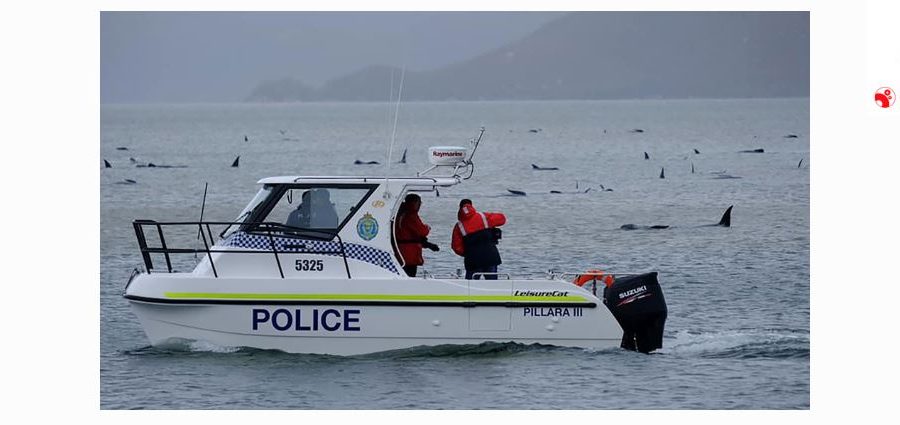Rescuers battle to save 270 whales stranded in Australia

Scientist says up to a third of the stranded animals may already be dead as ‘challenging’ rescue operation kicks off.
Rescuers were scrambling on Tuesday to save 270 whales stranded off the coast of the Australian island of Tasmania, amid fears that about a third of the animals had already died.
Scientists said the long-finned pilot whales became stuck on sandbars at Macquarie Harbour, on Tasmania’s rugged and sparsely populated west coast, on Monday.
Images from the scene showed shallow water thick with the large slick-black mammals manoeuvring for space.
Nic Deka, manager of Tasmania Parks and Wildlife Service, said marine specialists and rescuers were trialling efforts to determine the best rescue methods.
“We’ll be trying to free some whales this morning and if we’re met with the methods we’ve settled on, we’ll keep doing that, if not, we’ll adapt it and do different things to try and get a better result,” Deka told reporters.
Kris Carlyon, a wildlife biologist at the Marine Conservation Programme, said “about a third” of the animals were already dead and rescuing survivors would be a “challenging” task likely to take several days.The animals were only accessible by boat, limiting the number of rescuers able to reach them, he said.
Tricky rescue
While mass whale strandings occur relatively often in Tasmania, such a large group has not been seen in the area for more than a decade.
“In terms of mass whale strandings in Tasmania, this is up there with the trickiest,” Carlyon said, adding that rescuers will focus their efforts on the whales “with the best chance”.
“Some animals may be simply too big or in an unsuitable location,” he said.
About 60 people – including volunteers and local fish-farm workers – are battling cold and wet conditions to rescue the whales. The poor weather, however, could help the partially submerged whales survive for the several days the rescue is likely to take, Carlyon said.
“It’s pretty ugly for people on the ground but as far as the whales go it’s ideal – it’s keeping them wet, it’s keeping them cool.”
“Their social groups and strong bonding between the groups causes often all of them to strand,” Olaf Meynecke, a whale researcher and Project Manager of whales and climate at Griffith University, told.
========
Related News

President Trump threatens to cut off all trade with Spain
Experts note that implementing a full trade cutoff with an EU member state would faceRead More

Netanyahu’s political future at stake with Iran war: experts
With elections approaching in Israel, the war with Iran has handed Prime Minister Benjamin NetanyahuRead More


Comments are Closed